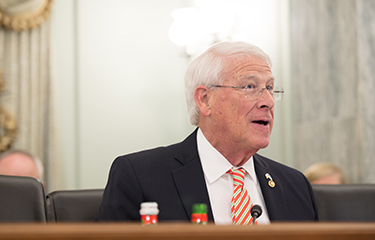U.S. lawmakers are making yet another attempt to pass the Advancing the Quality and Understanding of American Aquaculture (AQUAA) Act, a bill that would establish national standards for offshore aquaculture and streamline development.
First introduced in 2018, the legislation has gone through multiple iterations as lawmakers push for a comprehensive framework that encourages aquaculture operations in federal waters. The bill would make NOAA the lead federal agency on marine aquaculture, create a more uniform permitting system for offshore aquaculture in federal waters, and build a grant program to incentivize aquaculture innovation.
The most recent iteration of the legislation was reintroduced by U.S. Senator Roger Wicker (R-Mississippi) and U.S. Senator Brian Schatz (D-Hawaii) 7 June.
“The aquaculture industry is growing rapidly, but the lack of a national permitting system for federal waters has held back development and prevented American producers from growing more seafood at home,” Wicker said. “This legislation would establish comprehensive standards for offshore aquaculture, helping U.S. producers meet the growing demand for fresh, locally-sourced seafood.”
Schatz added that the legislation would help grow Hawaii’s growing aquaculture sector, which produced USD 80 million (EUR 74 million) in seafood products in 2019.
The bill has been referred to the Senate Committee on Commerce, Science, and Transportation, which Wicker sits on, for further consideration.
Neither the House nor the Senate version of the legislation made it out of committee last year, although industry coalition group Stronger America Through Seafood (SATS) remains optimistic that the legislation will find more support this cycle.
“What we have seen is increased dialogue around aquaculture, a reduction in the number of naysayers, and … more support coming out of some of the farm-producing states because they see a market for soy … and other farm-raised products as components to fish feed,” SATS Campaign Manager Drue Banta Winters told SeafoodSource.
Winters said the legislation is an opportunity for SATS to educate stakeholders on the climate and food security benefits of offshore aquaculture, as well as the ways technology has changed over the last two decades to reduce its environmental footprint. SATS worked to build support for the legislation with a three-day summit last year, bringing industry leaders to Washington, D.C. to promote the bill.
“There continues to be misinformation out there and a lack of understanding of those advances, from everything from fish feed … to the advances in siting to be able to minimize basic impacts and water quality impacts,” Winters said.
Support has grown, Winters added, although it’s difficult to determine whether the legislation will succeed this go around.
Don’t Cage Our Oceans, a coalition opposed to offshore aquaculture development, said the likelihood of the bill becoming law was “quite low.”
“So many people oppose it, as we've seen this through public comments on regulatory actions, and every other bill of the same nature didn't even make it out of committee,” Don’t Cage Our Oceans Campaign Director Andrianna Natsoulas told SeafoodSource. “Offshore finfish farming is unsafe at any speed - it has failed all around the world so much that countries once considered leaders on this method of production are actively pulling back (like Denmark and Canada), and in U.S. state waters, like in Washington state.”
In recent years, the White House has ...
Photo courtesy of the Office of U.S. Sen. Roger Wicker








